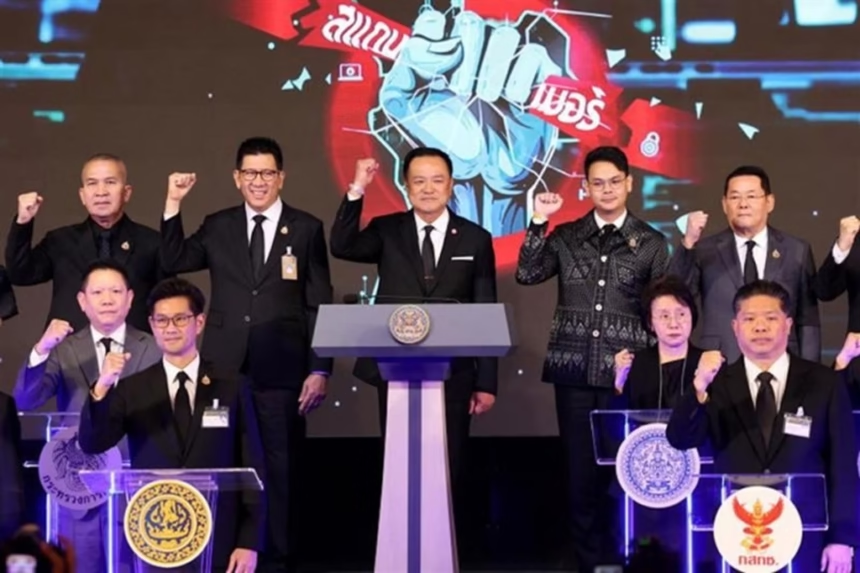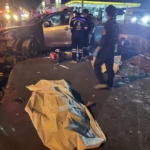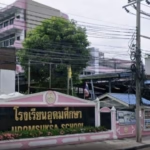BANGKOK – Thailand’s Prime Minister Anutin Charnvirakul on Thursday led a high-level event at Government House, signalling a firm push to tackle technology-related crime, with online scams at the centre of the crackdown. He framed the effort as a fight that must be won.
Fifteen state bodies signed a memorandum of understanding to work together under one national plan.
Anutin said online fraud is tearing apart lives, hurting families, and weakening public trust, the economy, and Thailand’s reputation. He warned that the hidden damage from such crimes cannot be counted in simple terms.
The memorandum of understanding sets out a shared framework for joint action against cybercrime. It puts special weight on breaking up scam networks that have increasingly targeted people in Thailand.
The prime minister said cybercrime now ranks as a major national security threat. He reaffirmed that tackling it is a priority for the government. He described the memorandum of understanding as a tool for action, not just a paper agreement. It reflects a shared mission across the state, not the burden of one office.
Under the agreement, Anutin set out five key measures:
- Strict legal action against offenders and anyone who supports them.
- Shared intelligence and coordinated investigations across agencies.
- Rapid asset freezes and financial disruption to block money laundering through Thailand.
- Use of advanced technology and AI to follow the money and spot criminal patterns early.
- Public education and support, helping people stay alert and join the effort against online scams.
He also responded to critics who claim the government has been slow to act on cybercrime. He said the gathering of senior leaders showed unity and a zero-tolerance stance toward any technology-based offences that harm the public.
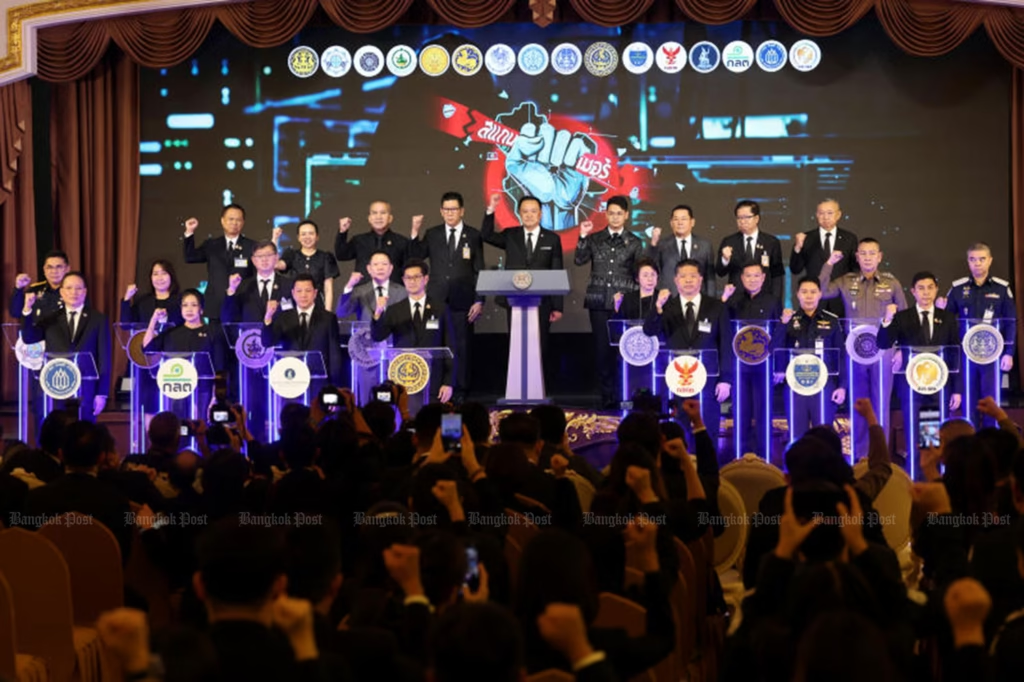
The signatories include the Anti-Money Laundering Office (Amlo), the Royal Thai Police, the Public Sector Anti-Corruption Commission, the Ministry of Digital Economy and Society, the Ministry of Justice, the Ministry of Interior, the Ministry of Finance, the Ministry of Foreign Affairs, the Bank of Thailand, the National Broadcasting and Telecommunications Commission (NBTC), the Securities and Exchange Commission (SEC), the Department of Special Investigation (DSI), the Thai Bankers’ Association, the Association of State Financial Institutions and the Ministry of Commerce.
Deputy Prime Minister and Finance Minister Ekniti Nitithanprapas attended the signing, along with Digital Economy and Society Minister Chaiyanok Chidchob, Justice Minister Rutthaphon Naowarat, national police chief Kittharath Punpetch, DSI chief Pol Maj Yuttahana Praedam, Bank of Thailand governor Vitai Ratanakorn, and representatives from the partner agencies.
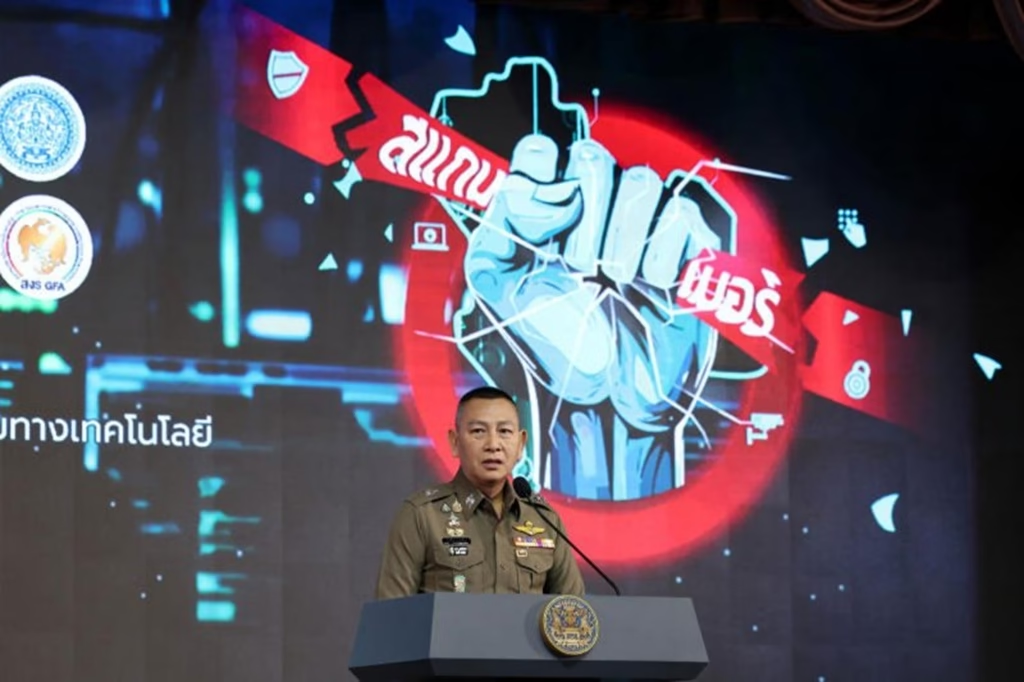
Police Chief Vows Crackdown on Scams
National police chief Pol Gen Kittharath Punpetch said the Royal Thai Police will press on with operations against scam networks and ignore outside claims that label the police as a criminal group.
He addressed recent remarks that called the RTP a criminal gang. He said the force is fully aligned with the government’s national policy to combat online scams, which have been classified as a serious threat with wide economic and social costs.
Kittharath said Thailand is not the base for most scam operations. Many groups operate from neighbouring countries. He added that Thailand works with Interpol and the United Nations to target scams, call centre gangs, and human trafficking rings, which are often linked.
He noted that some suspects from nearby countries try to hide in Thailand to avoid prosecution, and Thai authorities have been sending them back. He said arrest success depends on cooperation from those states.
Any officer or person found to be involved in wrongdoing will face strict legal action with no exceptions or protection. He said crimes that harm citizens will be punished, in line with the prime minister’s orders.
He acknowledged heavy criticism aimed at the police image. He called the accusation that the police are a large criminal organisation in Thailand deeply hurtful to officers who are doing their jobs. He said he has stayed calm and kept working despite constant attacks, but described the claim as a serious charge that no officer can accept.
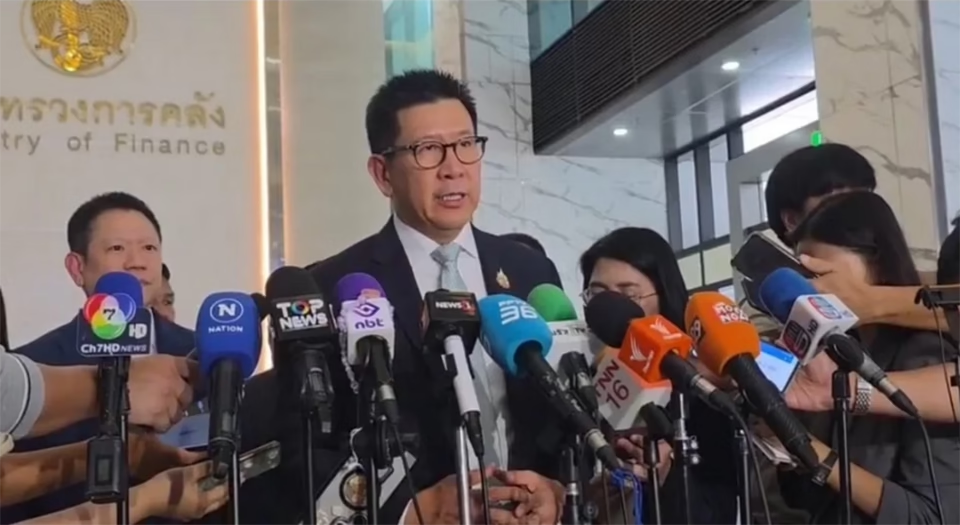
Emergency Decree to Regulate “Grey Money”
In a related move, Finance Minister Ekniti Nitithanprapas said the government is drafting an emergency decree to regulate “grey money” and reveal the true beneficiaries behind financial transactions. He spoke at the Standard Economic Forum 2025 and said the Digital Economy and Society Ministry is preparing the decree.
He said the prime minister sees the fight against grey capital as a top concern. On the night of 4 November, Anutin called him to a meeting that ran until 11.30 pm, and gave a clear order to push ahead with a full-scale crackdown without favour.
Ekniti said Thailand’s stable baht draws widespread use, including by scam groups. As financial tools move fast, criminals have used cryptocurrencies to clean grey money. Thailand must keep pace with these tactics.
To push the work forward, Anutin has set up four sub-committees. One targets the suppression of scam networks. A second handles technical measures against these groups. A third, chaired by Anutin, focuses on linking financial data under a “Connect the Dots” approach. A fourth oversees public communication. Anutin said Thailand’s anti-scam system must meet global standards under the Financial Action Task Force, or go beyond them.




